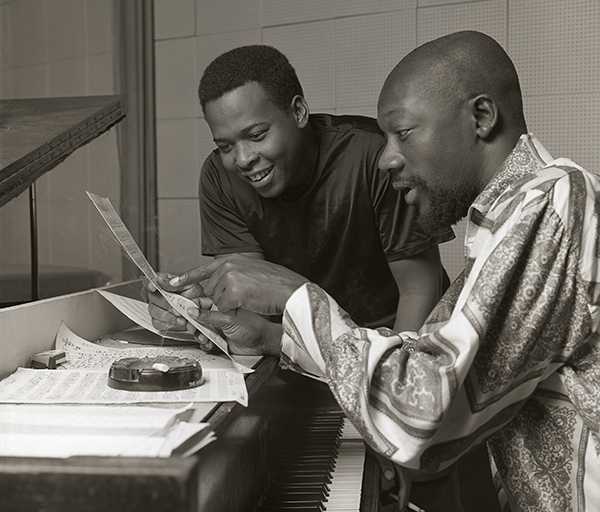
David Porter & Isaac Hayes
In the wake of Stax Records’ 1975 closure due to financial turmoil, an unexpected revival thrust the brand into a new era of Black American music. Despite the recent departure of Stax’s iconic finger-snap from the marketplace, the demand for dance floor-ready soul derivatives had shifted R&B’s focus away from Memphis’ sonic successes. Enter the late 1970s, a transformative period where Fantasy Records acquired the Stax brand and its remaining musical treasures, unveiling a rejuvenated sound that seamlessly blended familiar faces with emerging talents.
Founded in 1949 in San Francisco, California, Fantasy Records initially etched its name in music history with a keen focus on jazz. Established by brothers Max and Sol Weiss, Fantasy earned early acclaim in the genre with releases from Oakland pianist Dave Brubeck. However, its resonance extended beyond music, with Brubeck advising on artist acquisitions that shaped Fantasy’s evolution.
Soon assuming a reputation as the largest independent jazz label, Fantasy achieved significant wins building around rockers Creedence Clearwater Revival. Leveraging the substantial profits from CCR’s success, label leadership ambitiously acquired other iconic labels, adding the likes of Debut Records, Prestige Records, Riverside, Pablo, Specialty Records and Milestone to Fantasy’s portfolio. The zenith of Fantasy’s expansion came in 1977 when the label acquired the iconic Stax Records, etching a crucial chapter in both labels’ storied histories.
To revitalize the briefly dormant Southern soul powerhouse, Fantasy Records handed the keys to David Porter, a former Stax writer and producer with intimate knowledge of the soul landscape and Stax Records heritage. Tasked with delving into Stax’s rich musical archives, Porter unearthed unreleased gems and actively scouted new talent to contribute to the renewed Stax narrative.
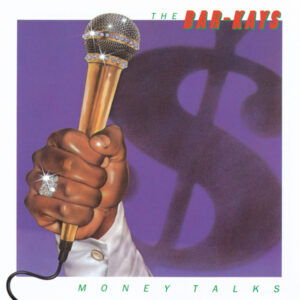
The Bar-Kays MONEY TALKS (1978)
Noteworthy among the archival materials that resurfaced from the Stax label in this period is Money Talks, an album of previously unheard recordings from the Bar-Kays. Despite the Bar-Kays moving on to Mercury records by the album’s 1978 release, it bolstered the band’s popularity, earning charting LPs and singles for two separate labels in the same year. Alongside releases from longstanding Stax artists Shirley Brown, the Emotions, and Albert King, Fantasy introduced debuting acts, positioning the pioneering soul label as a continuing force in the rapidly changing category of Black music.
Amidst the increasing dominance of funk and disco on radio playlists and dancefloors worldwide, Fantasy’s revival of Stax Records seamlessly adapted to the evolving musical landscape. In sync with this shift, Memphis, the label’s humble home turf, far removed from the music of the label’s 1960s heyday, gave rise to two new groups epitomizing a contemporary, funk-infused soul. Hailing from the local scene, the self-contained ensembles Circle O’Fire and Kilo followed in the footsteps of predecessors like the Bar-Kays, ensuring the continuity of Stax’s vibrant musical heritage.
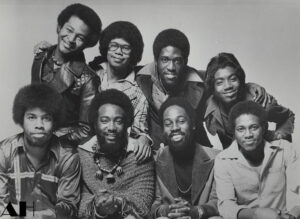
Circle O’ Fire
Circle O’Fire, initially the Soul Children’s touring band, released their sole single “Have It Your Way” and album Escape Hatch, in 1978. The group included the efforts of vocalist Larry O’Neil Johnson, keyboardist and vocalist Donald O’Conner, guitarist and vocalist Gregory McIntosh, bassist and vocalist George Journigan, trumpeter William Kirkwood, saxophonist John Sangster, percussionist Walter V ‘Ishmu’ Person, and drummer Tim Dancy. Despite Porter’s guidance, neither the group’s single nor their album achieved significant commercial success, highlighting the challenges in resonating with the market.
Likewise, Kilo released their only album on Stax in 1979, featuring the single “Satisfy Your Lovin’ (Dance).” The group featured percussionist and vocalist Jasper ‘Jabbo’ Phillips, keyboardist and vocalist Perry Michael Allen, bassist and vocalist Ray Griffin, percussionist and vocalist Terry Royce Johnson, and guitarist and vocalist Wendell P. Moore. Notably, Jasper ‘Jabbo’ Phillips was previously a member of the Stax Records recording group the Temprees. Despite accompanying Memphis-bred disco queen Anita Ward on tour in support of her smash-hit “Ring My Bell,” neither Kilo’s single nor their album impressed on the charts. The brief period at Stax marked the end of Kilo’s musical journey. The same couldn’t be said for their counterparts, Sho Nuff, who hailed from nearby Mississippi.
After finding modest success with their single, “I Live Across the Street,” their debut album, From the Gut to the Butt, and subsequent single “Funkasize You” fell short of commercial expectations. Unlike Kilo and Circle O’Fire, Sho Nuff would endure beyond their stint on Fantasy’s Stax imprint. Jackson, Mississippi-based Malaco Records picked the group up for two additional LPs, 1980’s Tonite and 1982’s Stand Up for Love.
Founded far from Stax’s original outpost in the South, Philadelphia’s Fat Larry’s Band, led by drummer Larry James, holds the distinction of the longest-tenured recording career among Fantasy’s new blood on Stax Records. Their inclusion on the label became possible due to a joint venture between Fantasy and an independent record company, WMOT (We Men of Talent), for which the group had recorded an album, Feel It, before working with Stax/Fantasy. When WMOT changed its distribution to Fantasy, the label agreed to release the group’s sophomore LP under the Stax Records brand. Their single “Peaceful Journey” netted the band ripples on the U.S. R&B chart, and their Stax/Fantasy album Off the Wall did little to excite domestic fans in 1977. However, the band was a darling among British listeners, who supported them well into the 1980s across multiple LPs on Fantasy, which didn’t bear the iconic Stax branding, a subsequent independent WMOT release, and a stint on Virgin Records. The group even had its day in the sunshine during the digital age, as their song “Act Like You Know” appeared on the soundtrack for the blockbuster 2002 video game Grand Theft Auto: Vice City.
by Jared Boyd
The Innovators: Stax Artist Spotlights ARCHIVE
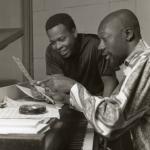

Ollie & The Nightingales
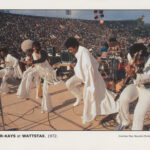
The Bar-Kays

24-Carat Black

The Temprees

The Soul Children

The Mar-Keys

Delaney & Bonnie

Stax Groups – The Astors, Jeanne & The Darlings & the Charmels

The Mad Lads

The Dramatics

The Emotions

Johnnie Taylor

The Bar-Kays

Otis Redding

The Dramatics

RUFUS & CARLA THOMAS

Sam & Dave

The Emotions


